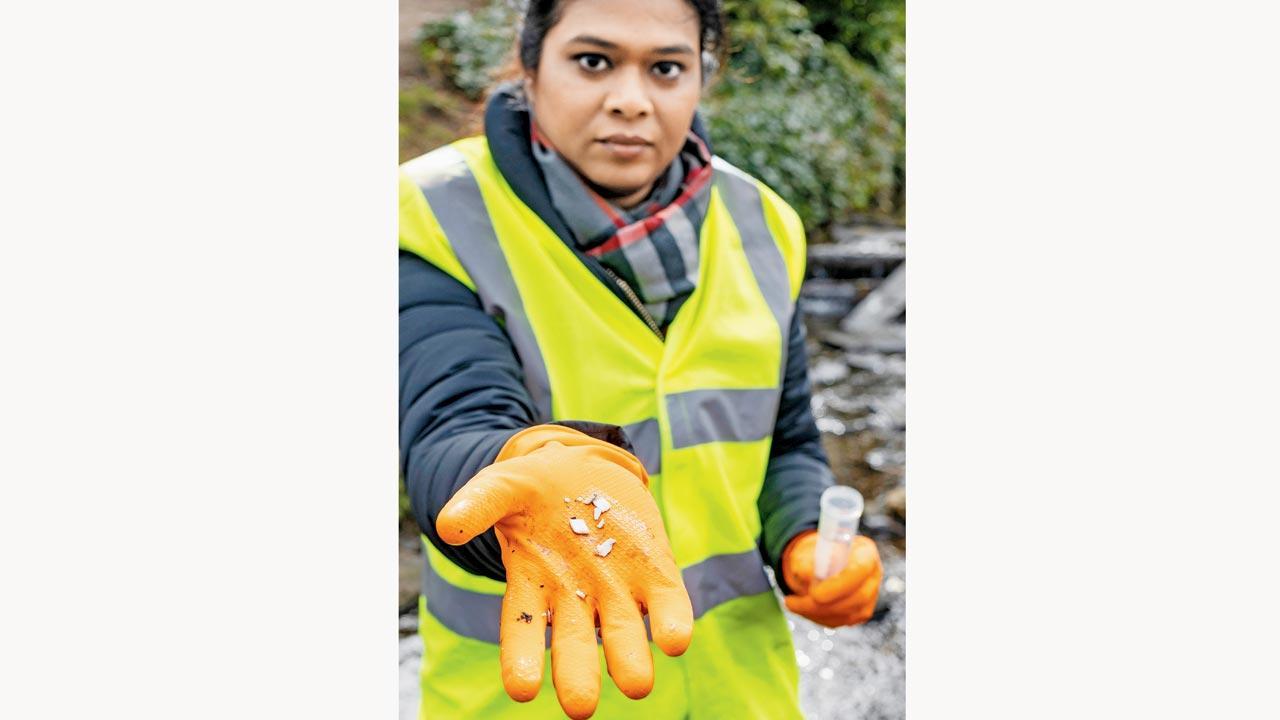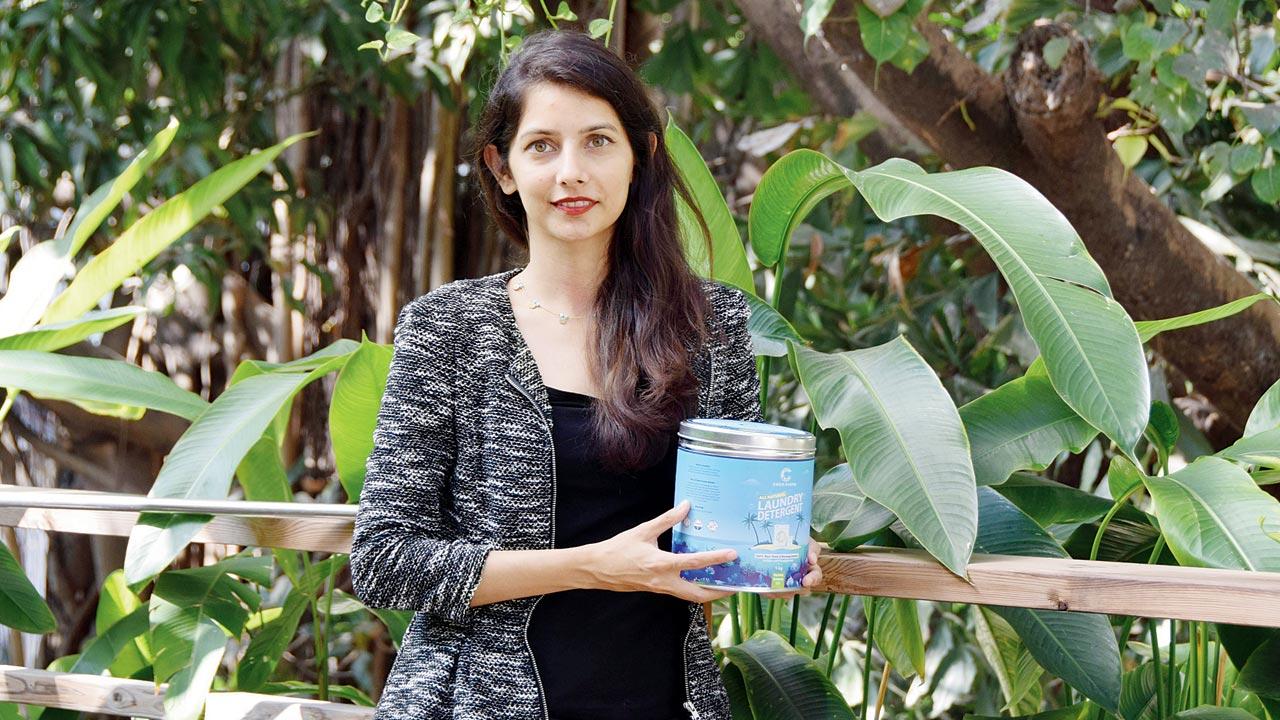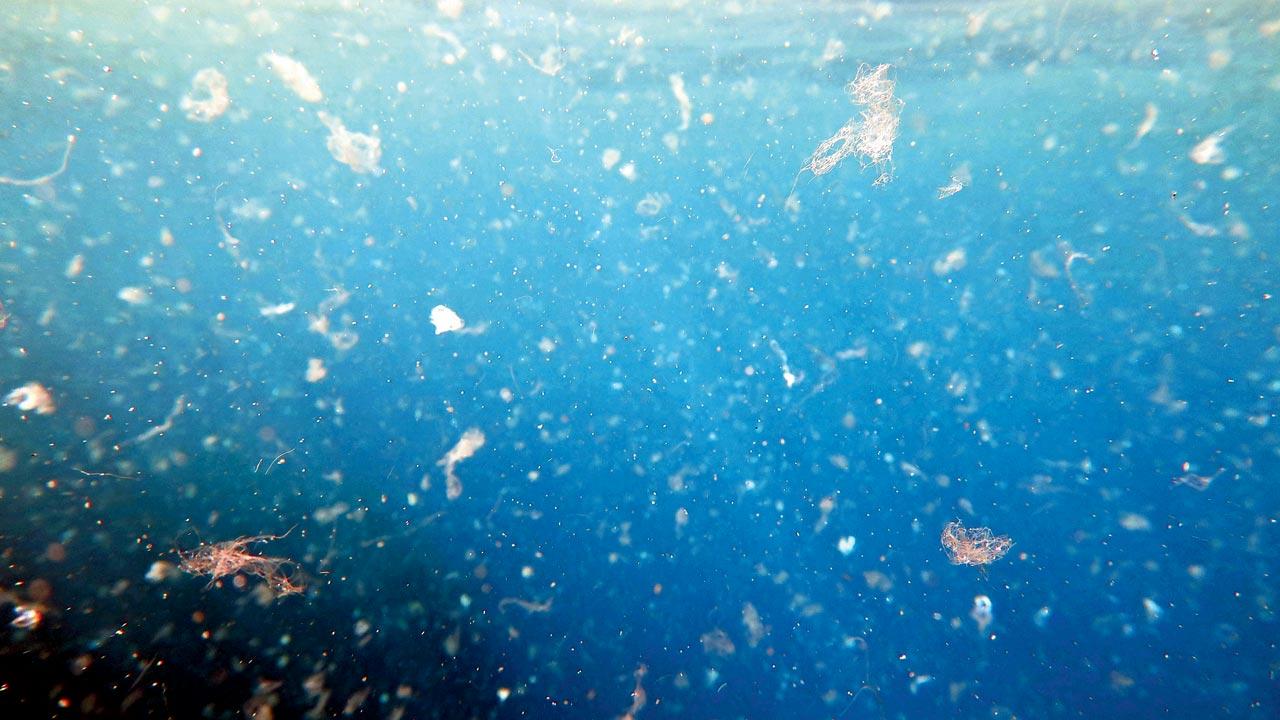To wear clothes made from recycled plastic is not sustainable. To launder polyester and nylon means adding micro pollutants to the world’s waters. These and more fashion polluting habits you should quit on World Environment Day

Pic/iStock
 It’s everywhere: hidden in the texture of wool, the lightness of linen and the smoothness of silk. It’s in two-thirds of our clothing— and yet most of us don’t know it’s there. It’s plastic, and it’s everywhere.
It’s everywhere: hidden in the texture of wool, the lightness of linen and the smoothness of silk. It’s in two-thirds of our clothing— and yet most of us don’t know it’s there. It’s plastic, and it’s everywhere.
Synthetic fibres—along with elastane, nylon and acrylic—already account for 69 per cent of all textiles produced in the world. This figure is expected to reach nearly three-quarters by 2030 according to a report researched by Changing Markets Foundation. Polyester alone makes up 52 per cent of all fibre production. Petroleum-based synthetics like polyester and nylon are cheap to make, sturdy and flexible, and used to produce anything from fleece jackets, T-shirts to yoga slacks and tracksuits.
 In 2019, Aakash Ranison and Jellyfish Watersports collaborated on a clean-up drive at Beypore beach in Kozhikode. The 2,000 single-use bottles collected were used to make the world’s first marine cemetery, with nine gravestone-like markers, each constructed on an iron frame holding up neatly stacked plastic bottles. These represent one critically endangered species each
In 2019, Aakash Ranison and Jellyfish Watersports collaborated on a clean-up drive at Beypore beach in Kozhikode. The 2,000 single-use bottles collected were used to make the world’s first marine cemetery, with nine gravestone-like markers, each constructed on an iron frame holding up neatly stacked plastic bottles. These represent one critically endangered species each
While it’s no secret that too many of the plastic products we use end up in the ocean, a major source of that debris is our clothes. An average person releases roughly 300 million microfibres (thinner than a human hair) per year by doing laundry, states PlanetCare website. The sheer amount of clothes an individual owns (usually more than 100 pieces) puts the textile industry on the top as the single biggest microplastic polluter.
A recent report in Nature magazine ballparks the amount anywhere between 640,000 and 1,500,000 microfibre pieces shed per wash, which travel to your local wastewater treatment plant, where up to 50 per cent enter rivers, oceans and soil, and also sneak their way into the food chain. In the first public scientific investigation by Orb Media, more than 80 per cent of the samples collected across five continents tested positive for the presence of plastic fibres in tap water. New Delhi reported 82 per cent.
 Aakash Ranison
Aakash Ranison
There is evidence of plastic fibres in the Arctic waters, reports The Guardian, and a study by Britain’s Royal Society discovered microfibres plumbed in the depths of the Mariana Trench, one of the world’s deepest ocean trenches.
In Mumbai, nearly 21 million tonnes of untreated waste is released into the sea every day. What chance does our marine life have?” says Shaan Lalwani, who is trying to make a difference in the laundry room. The 37-year-old, Mumbai entrepreneur is the founder of Coco Custo, an eco-friendly, vegan laundry detergent brand. An engineer by education, Lalwani worked in the real estate industry for a decade before she decided to launch her detergent brand. “I always tell people that the idea came to me 25 metres below sea level when I was diving in Mauritius. Earlier that day, instructors told us how the cleaning chemicals dumped into the ocean were killing coral reefs that support 25 per cent of all marine life,” she says. It took 18 months of market study, relearning chemistry and research to identify possible raw biodegradable materials and processes that are both sustainable and scalable. She launched the brand in 2019 and operates from “a cottage industry almost” unit in Mumbai.
 Shaan Lalwani, 37, is the Mumbai-based founder of Coco Custo, an eco-friendly, vegan laundry detergent brand that she says is free of SLS, sulphates, optical brightener parabens, artificial fragrances and dyes. The one-kg tin costs Rs 380, and you get 50 washes from it
Shaan Lalwani, 37, is the Mumbai-based founder of Coco Custo, an eco-friendly, vegan laundry detergent brand that she says is free of SLS, sulphates, optical brightener parabens, artificial fragrances and dyes. The one-kg tin costs Rs 380, and you get 50 washes from it
Unlike with cosmetics, manufacturers of detergents are not obliged to list all ingredients on product packaging. “The tiny particles you see floating in water after you soak clothes in powder detergent are, in fact, microplastics that are used to act as scrubbing agents. These insoluble plastic particles remain dispersed in water and get flushed into our drainage,” says Lalwani, adding that they use plant-based surfactant made from certified organic coconut and natural essence oils from South India. “Our powder detergents have qualities similar to liquid detergents. It’s free of SLS, sulphates, optical brightener parabens, artificial fragrances, dyes and lather boosters, etc., all the things that are bad for you and the planet. It’s also packaged in a steel tin to reduce plastic footprint.”
As of January 2025, all new washing machines in France will have to include a filter to stop synthetic clothes from polluting waterways. This makes it the first country to take legislative steps in the fight against plastic microfibre pollution. “While there is no such thing as the perfect solution, filters help to a large extent,” she adds.
 In the first public scientific investigation by Orb Media, more than 80 per cent of the samples collected from five continents tested positive for the presence of plastic fibres in tap water. New Delhi reported 82 per cent. Microplastics contaminate the sea and seafood
In the first public scientific investigation by Orb Media, more than 80 per cent of the samples collected from five continents tested positive for the presence of plastic fibres in tap water. New Delhi reported 82 per cent. Microplastics contaminate the sea and seafood
Because smooth, stretchy materials like yoga slacks are made of longer fibres, they have less threads protruding, and “lesser likely to shed fibres,” points out Lalwani. “It would also help if fashion designers start talking about the microplastic problem.”
Sometimes, inspiration comes from the place you’d least expect it. For couturier Amit Aggarwal, 42, it was the dump yard he’d pass on the way to his studio in New Delhi. “We don’t call it waste,” he clarifies, “we call it materials”. From upcycling discarded Patola sarees to working with recycled polymer strips and rubberand leftover sequin tubes, and transforming them into artisanal details on fabrics such as tulle, silk and lace, Aggarwal offers a different kind of approach to couture. “We are constantly reminded about what constitutes luxury fashion, and that only certain fabrics and surface textures fit the bill. And so, it’s through exploring discarded materials that we ask: ‘Why not?’”

Shubhi Sachan
Given the fashion industry’s colossal carbon footprint, the appeal for the narrative of recycled materials is clear. “We don’t claim to be experts on recycling or use the latest scientific research, and that’s why we are mindful about not using terms like ‘sustainable’ in our communication.”
As for the issue of microplastics, Aggarwal approaches the question from a different angle: “My clients don’t have the heart to put it [his garments] in the washing machine”. “Even though our label instructions read, ‘dry-clean only’, they can just as easily be hand-washed. For me, the lifecycle of the garment is important. Most of our pieces are weightless and can be easily folded and put away. There is very little ironing required too.”
 A shot from Amit Aggarwal’s fashion film for his couture collection 2020, which featured models floating in water dressed in diaphanous lehengas coated with metallic polymer strips and embroidery
A shot from Amit Aggarwal’s fashion film for his couture collection 2020, which featured models floating in water dressed in diaphanous lehengas coated with metallic polymer strips and embroidery
I am frustrated with our policies,” Aakash Ranison, an independent climate change advocate, says on the phone from Leh. “A climate emergency should have been declared by now. Instead, we are replacing plastic bags with cloth. If you burn this cloth bag, you’ll find that it does not perish completely, leaving behind a black soot, an indication that the material was blended with polythene.”
Ranison claims that he owns four pairs of trousers— joggers, jeans, cargos and shorts. When it comes to clothing, he feels, personal validation translating into ‘likes’ on social media is more important than questioning how and where the outfit is made, or from what it is made. “We still don’t relate microplastics with clothing. In fact, each one of us is presently consuming 3 to 5 million microfibres daily through liquids such as water, beer and wine.”
 Amit Aggarwal
Amit Aggarwal
In November 2019, Ranison and Jellyfish Watersports collaborated on a clean-up drive at Beypore beach, Kozhikode, where 80 participants managed to collect a staggering 800 kilos of plastic waste. While most of the solid waste was handed over to the municipality for recycling, 2000 single-use bottles were left behind. The team decided to create a marine cemetery, a first-of-its-kind in the world, comprising nine gravestone-like markers, each constructed on an iron frame holding up neatly stacked plastic bottles. These represent one critically endangered species each, and stand at four feet. The only exception is Miss Kerala, a native freshwater fish, who towers at four-feet tall.
Ranison says that most clothing companies put a lot of money into marketing products, but finds little evidence that they’ve put as much money into research and development of new synthetic fabrics that will not shed microfibres. “Nature should be in focus while drafting solutions but we are busy trying to make money off it,” he rues. “We see this in a growing number of brands switching to recycled fibres, often advertising these clothes as the more ‘sustainable’ choice when that’s far from true. A recycled garment sheds 65 per cent more fibre in the wash than the new one made from virgin polyester. Breaking a plastic bottle into millions of
fibrous bits of plastic might prove to be worse.”
Shubhi Sachan, design consultant and founder of Material Library of India—a company focused on investigating value chains and making industrial and agricultural waste materials come to life again—doesn’t see the point of taking away bottles from the bottling industry. “When plastic is turned into polyester [for clothing], we’re taking it away from a closed-loop system.”
Because of this, Sachan says that textile manufacturers and designers gloating about garments created from recycled PET plastic bottles as some kind of virtuous act is tantamount to green washing. “It’s recycled but is it recyclable? Plastic can be recycled into plastic again and again. But when you break it down into filament and then into yarn or fabric and finally into the product, you take it too far from its original state and it will eventually end up polluting our oceans,” explains Sachan, who has previously worked with Godrej and Ikea Sweden, Dr Reddy’s and Afroz Shah Foundation on waste management.
She believes that waste needs to be declared as an industry by the government, “because the moment it’s recognised as a standalone business, which is at the heart of a circular economy, strict policies and regulations will mandate responsible design, production and consumption of plastics.”
300M
Amount of microfibres an average person releases per year by just doing laundry according to PlanetCare website
How to reduce microfiber pollution

The best way to do this is to start with your laundry. A few simple changes to the routine can make all the difference.
1. Washing clothes in cold water (23 degree Celsius) with shorter cycles, reduces microfiber shedding by up to five times. Instead of tumble drying your clothes, hang them out to sun-dry.
2. Collect the clothes through the week and try to fill your washing machine up to the recommended capacity. Washing garments in a full load of laundry can reduce shedding up to five times.
3. Most laundry detergents perform as well at half the recommended dose. Read the instructions on packaging and use half.
4. Some research suggests that liquid detergents are generally more eco-friendly than powder as they trigger less friction.
5. Try and consider if garments need washing after every wear. Jeans, for instance, can be aired in the sun and washed after a few wears.
6. If you stain a garment, spot cleaning is the best way to treat it instead of doubling your detergent amount.
7. Invest in washing machines that come with in-built microfibre filters as they are proven to capture microfibres at source. “Empty out the filter after every wash and place the fibres in a plastic bottle. Repeat the process until full. These are called eco-bricks, which can be deposited at recycling units in your city,” suggests Shaan Lalwani.
8. Finally, if you have followed the care instructions correctly, and something still goes wrong with a garment the first time you wash or dry-clean it, remember your rights as a consumer and address the problem with the brand.
 Subscribe today by clicking the link and stay updated with the latest news!" Click here!
Subscribe today by clicking the link and stay updated with the latest news!" Click here!








